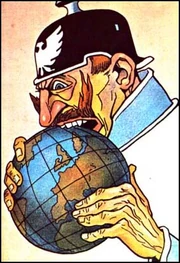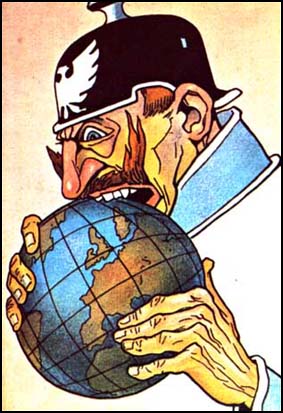title 
Welt Politik Edit
Edit
In modern days, the world knows that the First World War was caused by a numerous different factors. One of them was the World Politic, otherwise known as “Welt Politik”. Many historians argue that the world politic was the main cause of the outbreak of war in 1914.
The world politic was basically a policy, encouraged by Kaiser Wilhelm II, that involved a very aggressive and expansionist approach in order to increase the growth of the German Empire. This policy contributed to the war because it provoked many neighbouring countries awareness that Germany had quiet an aggressive ambitions. Another description of the new policy is that it was a policy based on expanding German power overseas and to increase their land power.
The Welt Politik differed greatly from Bismarck’s policy, who proclaimed their end in 1890. The new Kaiser rejected most of his predecessor’s politics on security in Europe. Bismarck had played chess where strategic moves were calculated in advance. The Kaiser Wilhelm II however, played poker where ‘bluffing’ and taking ‘risks’. Bismarck’s aim to keep Germany as the centre point of European relations had succeeded in his reign. The new Kaiser wanted and thought that Germany needed a ‘place in the sun’.
Wilhelm II thought that colonies in the world would be indispensable for Germany’s future and was ready to invest and take part in the colonial disputes between France and England. The Kaiser, highly influenced by Britain’s overseas empire and naval strength, was determined that the Welt Politik was impossible without a very powerful navy. Germany sought out an agreement with Great Britain for either its cooperation or neutrality whilst Germany expands their power in the world. Toward the end of the 1890’s, it was suggested that Germany built a large navy in order to protect its seas. . In 1890, Germany had accelerated their colonial policy, putting pressure on Britain. The Kaiser both resented and admired Great Britain for her naval and overseas power. It was then that this approach of expansion, was called the ‘World Politics’. There was great discussion between Britain and Germany to form an alliance, however it ended nowhere because none of them were prepared to offer anything in return. When Germany informed Britain about their expansionist ambitions, Britain immediately felt threatened, and therefore started building a larger navy.
Public opinion grew in favour of the Kaiser’s policy, especially after the Franco-Prussian War, where many Germans developed and anti-French policy. France had made an alliance with Russia and they supported each other’s colonies in 1894. Kaiser Wilhelm II did not take notice of the alliance that Bismarck struggled so long to prevent.
Germany was also extending her interests towards the Balkans and the Middle East with the great aim of building a railway from Baghdad to Berlin. This would effectively increase trade and expand German influence around the world. Another event that contributed to the outbreak of war in 1914, was the Moroccan Crisis (1905 and 1911). The German intrusion in Morocco drove Britain and France closer together, which, to Germany’s surprise, was impossible, given their ancient rivalry. At that point, the Kaiser’s colonial policy started working against Germany.
In conclusion, the Welt Politik contributed to the outbreak of the war in 1914 in a number of different ways, as it was a long-term cause of the war.
Bibliography
- · ‘Britannica 21, 15th Edition’ encyclopedia published in 1995
- · ‘Bismarck and the German Empire 1871 – 1914’ – Lynn Abrams published in 1995
- · ‘Germany in the Age of Kaiser Wilhelm II’ – James Retallack published in 1996
- · ‘Imperial Germany’ – Stephen J. Lee published in 1999
- · ‘The Modern World’ - The Hutchinson Chronology of World History, Volume IV: 1901 – 1998, Meril Williams published in 1999


Source
No comments:
Post a Comment